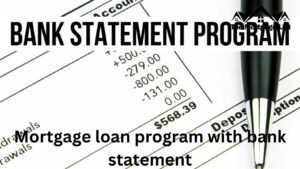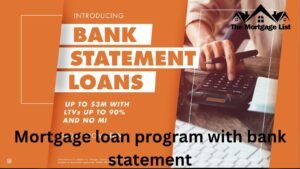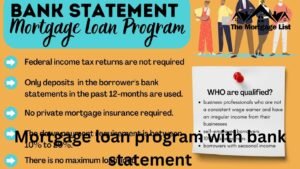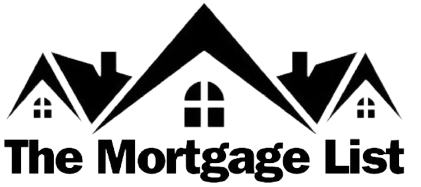Mortgage Loan Program with Bank Statement: Unlocking Homeownership Opportunities
Purchasing a home is a significant milestone in one’s life, but for many prospective buyers, the path to homeownership may seem daunting, especially when it comes to securing a mortgage loan. Traditional mortgage programs often require strict documentation of income, which can pose challenges for individuals with unconventional income sources or those who are self-employed. However, mortgage loan programs with bank statements offer a viable solution, providing flexibility and accessibility to a wider range of borrowers.
1. Introduction to Mortgage Loan Programs
In essence, a mortgage loan is a type of loan specifically used to purchase real estate. When applying for a mortgage, lenders typically require various documents to verify the borrower’s financial stability and ability to repay the loan. Bank statements play a crucial role in this process, offering insight into the borrower’s income, expenses, and overall financial health.
2. Benefits of Mortgage Loan Programs with Bank Statements
Flexibility in Income Verification
Unlike traditional mortgage programs that rely heavily on tax returns and W-2 forms, mortgage loan programs with bank statements allow borrowers to use their bank statements as proof of income. This flexibility is particularly beneficial for individuals with non-traditional income sources or those who may not have consistent pay stubs.
Opportunity for Self-Employed Individuals
For self-employed individuals, proving income can be challenging, as their earnings may fluctuate from month to month. Bank statement mortgage programs alleviate this burden by considering deposits into the borrower’s bank account as income, providing a more accurate representation of their financial stability.
Streamlined Application Process
By eliminating the need for extensive documentation such as tax returns and employment verification, mortgage loan programs with bank statements offer a streamlined application process, allowing borrowers to obtain financing more quickly and efficiently.

3. Eligibility Criteria for Mortgage Loan Programs
Minimum Credit Score Requirements
While credit score requirements may vary depending on the lender and the type of loan, most mortgage loan programs with bank statements typically require a minimum credit score of around 580 to 620.
Debt-to-Income Ratio Considerations
Lenders also assess the borrower’s debt-to-income (DTI) ratio, which compares their monthly debt payments to their gross monthly income. Generally, a DTI ratio below 43% is considered favorable for mortgage approval.
Documentation Requirements
Although mortgage loan programs with bank statements offer flexibility in income verification, borrowers are still required to provide certain documentation, such as recent bank statements, identification documents, and proof of assets.
4. Types of Mortgage Loan Programs with Bank Statements
There are several types of mortgage loan programs that accept bank statements as proof of income, including:
Conventional Mortgage Loans
Conventional loans are not insured or guaranteed by the federal government and typically require a down payment of at least 3%.
FHA Loans
Backed by the Federal Housing Administration, FHA loans offer low down payment options and are accessible to borrowers with lower credit scores.
VA Loans
Available to eligible veterans, active-duty service members, and surviving spouses, VA loans offer favorable terms and do not require a down payment or private mortgage insurance (PMI).
USDA Loans
USDA loans, backed by the U.S. Department of Agriculture, are designed to help low- to moderate-income borrowers in rural areas achieve homeownership with zero down payment.

5. How to Apply for a Mortgage Loan Program with Bank Statements
Preparing Necessary Documents
Before applying for a mortgage loan, borrowers should gather all required documentation, including recent bank statements, tax returns, pay stubs, and identification documents.
Finding a Suitable Lender
Researching and comparing lenders is essential to find one that offers mortgage loan programs with bank statements and favorable terms that align with the borrower’s financial goals.
Completing the Application Process
Once a lender has been selected, borrowers can begin the application process, which typically involves completing a loan application, providing documentation, and undergoing a credit check.
6. Tips for a Successful Mortgage Loan Application
Maintaining Good Credit Habits
Building and maintaining a good credit score is crucial for securing favorable terms on a mortgage loan. Borrowers should strive to pay bills on time, keep credit card balances low, and avoid opening new lines of credit before applying for a mortgage.
Saving for a Down Payment
While some mortgage loan programs with bank statements offer low or no down payment options, having a larger down payment can lower monthly payments and reduce overall interest costs.
Seeking Pre-Approval Before House Hunting
Getting pre-approved for a mortgage loan can give borrowers a clear understanding of their budget and increase their credibility as serious buyers when making an offer on a home.
7. Common Misconceptions about Mortgage Loan Programs with Bank Statements
Limited Options for Self-Employed Individuals
Contrary to popular belief, mortgage loan programs with bank statements offer viable options for self-employed individuals, allowing them to qualify for financing based on their bank account activity.
Higher Interest Rates
While interest rates may vary depending on the borrower’s credit history and financial profile, mortgage loan programs with bank statements often offer competitive rates comparable to traditional mortgage programs.
Difficulty in Qualifying for Loans
Although unconventional income sources may present challenges, mortgage loan programs with bank statements are designed to accommodate a diverse range of borrowers, including those with non-traditional income.
8. Case Studies: Success Stories with Mortgage Loan Programs
Real-Life Examples of Individuals Benefiting from Bank Statement Programs
Consider the case of Sarah, a freelance graphic designer who struggled to qualify for a traditional mortgage due to her variable income. With a mortgage loan program that accepts bank statements, Sarah was able to purchase her dream home based on her consistent bank deposits.
How Unconventional Income Sources Can Still Qualify for Mortgage Loans
Whether it’s rental income, investment dividends, or freelance earnings, mortgage loan programs with bank statements recognize various sources of income, making homeownership accessible to a wider range of borrowers.

9. Understanding Interest Rates and Terms
Factors Affecting Interest Rates
Interest rates on mortgage loans are influenced by factors such as the borrower’s credit score, loan amount, loan term, and prevailing market conditions.
Importance of Understanding Loan Terms
Before committing to a mortgage loan, borrowers should carefully review and understand the terms of the loan, including interest rates, repayment schedule, and any associated fees.
10. Pros and Cons of Mortgage Loan Programs with Bank Statements
Advantages
- Flexibility in income verification
- Accessibility to self-employed individuals
- Streamlined application process
Disadvantages
- Potential for higher interest rates for certain borrowers
- Limited options for borrowers with poor credit history
11. Frequently Asked Questions (FAQs)
What credit score is needed for a mortgage loan program with bank statements?
Most lenders require a minimum credit score of around 580 to 620 for mortgage loan programs with bank statements.
Can I apply for a mortgage loan if I’m self-employed?
Yes, mortgage loan programs with bank statements are tailored to accommodate self-employed individuals by considering bank deposits as income.
How do bank statement loans differ from traditional mortgage programs?
Bank statement loans offer flexibility in income verification by allowing borrowers to use their bank statements as proof of income, whereas traditional mortgage programs typically require tax returns and W-2 forms.
Are there specific income requirements for bank statement mortgage loans?
While specific income requirements may vary by lender, bank statement mortgage loans typically require borrowers to demonstrate consistent deposits into their bank accounts.
Is it possible to refinance a mortgage loan obtained through bank statements?
Yes, borrowers may be eligible to refinance their mortgage loan obtained through bank statements, provided they meet the lender’s eligibility criteria and qualifications for refinancing.
12. Conclusion
In conclusion, mortgage loan programs with bank statements offer a viable pathway to homeownership for individuals with unconventional income sources or those who may not qualify for traditional mortgage programs. By providing flexibility, accessibility, and streamlined application processes, these programs empower a diverse range of borrowers to achieve their dreams of owning a home.
FAQs
- What credit score is needed for a mortgage loan program with bank statements?
- Most lenders require a minimum credit score of around 580 to 620 for mortgage loan programs with bank statements.
- Can I apply for a mortgage loan if I’m self-employed?
- Yes, mortgage loan programs with bank statements are tailored to accommodate self-employed individuals by considering bank deposits as income.
- How do bank statement loans differ from traditional mortgage programs?
- Bank statement loans offer flexibility in income verification by allowing borrowers to use their bank statements as proof of income, whereas traditional mortgage programs typically require tax returns and W-2 forms.
- Are there specific income requirements for bank statement mortgage loans?
- While specific income requirements may vary by lender, bank statement mortgage loans typically require borrowers to demonstrate consistent deposits into their bank accounts.
- Is it possible to refinance a mortgage loan obtained through bank statements?
- Yes, borrowers may be eligible to refinance their mortgage loan obtained through bank statements, provided they meet the lender’s eligibility criteria and qualifications for refinancing.
Read More:>

